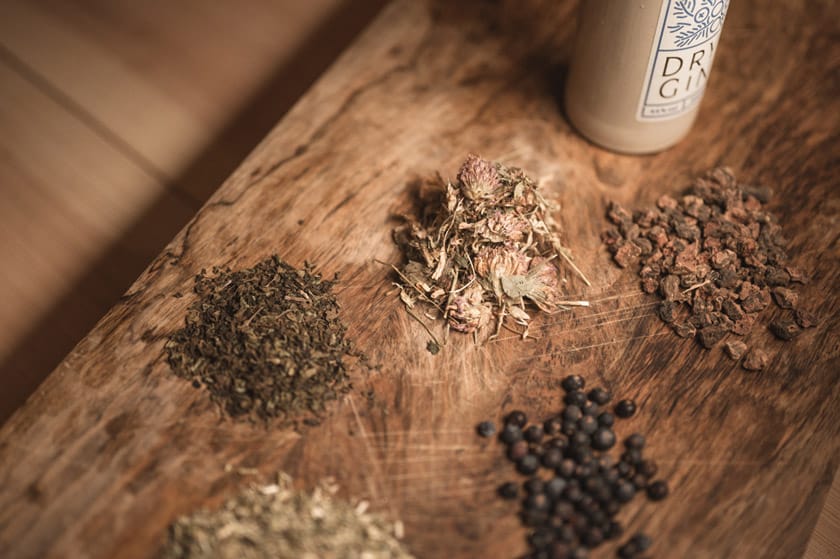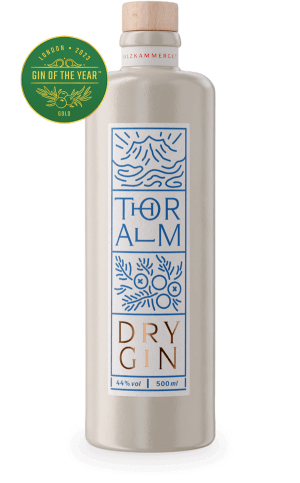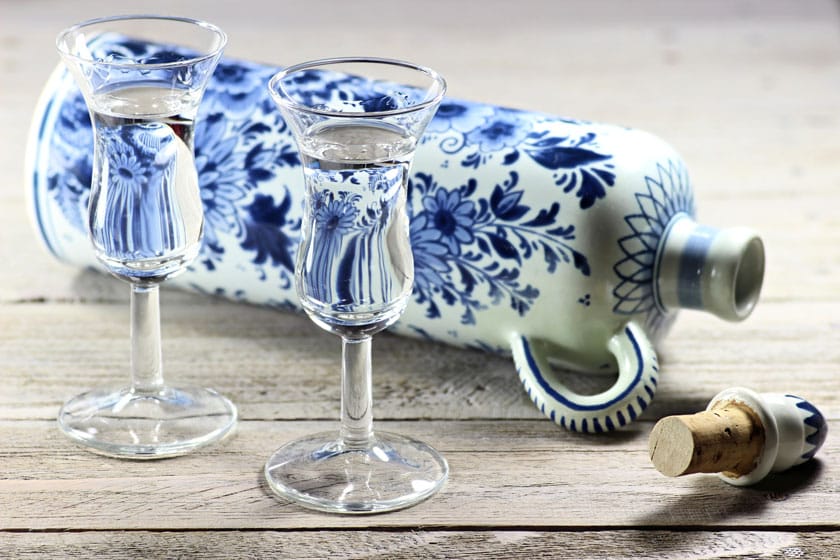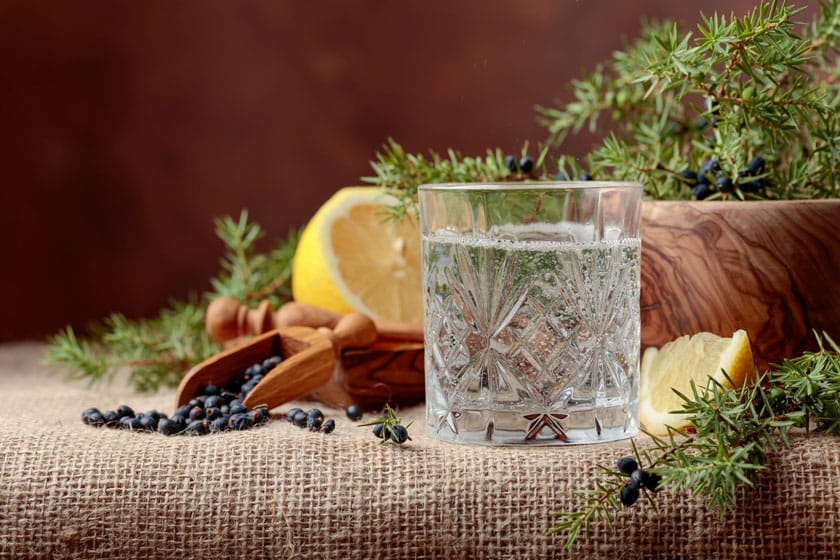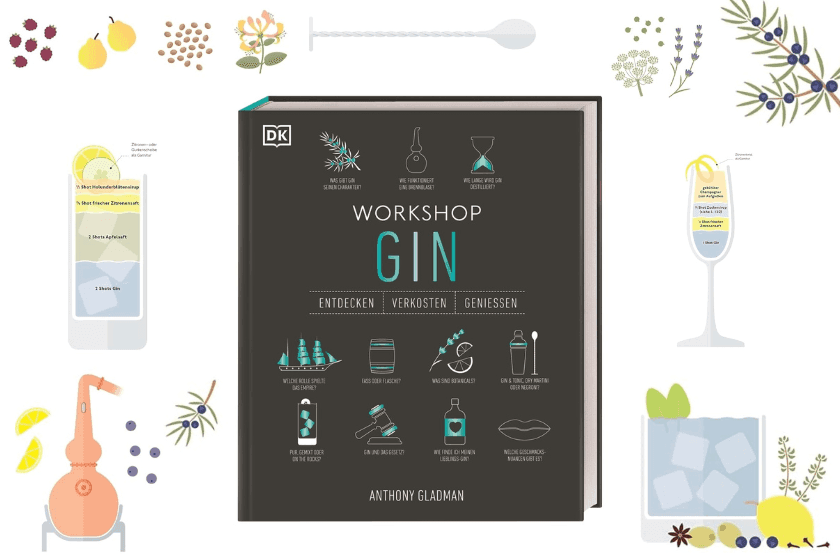Gin is currently experiencing a remarkable rebirth, and it's not just limited to the traditional gin and tonic. At the heart of this versatile spirit's resurgence are the botanicals - the natural ingredients that give each gin its unique aroma. In this article, you'll discover the variety and importance of these aromatic ingredients and learn how they determine the characteristic properties of each gin.
Botanicals at a Glance: An Introduction
What are botanicals?
Botanicals are essential, natural ingredients that are used in gin production used to shape the unique character and distinctive profile of the final product. This category includes a wide range of herbs, spices, flowers and fruits. Each of these elements is carefully selected to evoke specific flavor and aroma notes in the gin. Botanicals are the key distinguishing feature that gives gin its specific identity and sets it apart from other spirits. Their diversity and specific combinations allow for an almost infinite variety of gin varieties.
The Role of Botanicals in Gin Production
Botanicals aren't just additives; they're the soul of gin. Without them, gin would be nothing more than a simple, neutral alcohol without any flavor nuances. Botanicals go through a careful selection process overseen by distillers to ensure each gin gets its desired flavor profile. During the distillation process, these botanicals are either infused directly into the alcohol or placed in an aroma basket above the vapors so that the essential oils and flavors can be effectively extracted. This critical process not only determines the base flavor of the gin, but also influences its complexity, depth, and the aromatic aftertaste that remains after drinking.
The choice of certain botanicals and their balance is therefore crucial to the final product, and slight changes in the recipe or manufacturing method can lead to significantly different results.
Classic and exotic botanicals
The traditional ingredients: juniper and more
Juniper berries are not only a traditional ingredient in gin production, but also a legal requirement. Their unmistakable aroma, which varies between resinous and spicy, forms the foundation of almost all gin variants. These small, dark blue berries are known for their ability to shape the core flavor that gives gin its characteristic touch. Their use goes back to the origins of gin and remains an indispensable ingredient that allows a distillate to be classified as gin in the first place.
From lavender to coriander: expanding the variety
In addition to juniper, a variety of other botanicals are crucial to the production of gin. Commonly used include coriander, which provides a slightly lemony nuance; angelica root, which is often used to ground the flavors and add depth; and citrus, whose peels add a fresh, vibrant note. Lavender, on the other hand, adds a subtle floral component that is especially appreciated in more modern gins. Each of these botanicals is crucial to the complexity of the flavor profile, adding layers of flavors that unfold in the finished product.
Exotic botanicals: A trend that is conquering the gin world
More recently, gin makers have begun to experiment beyond traditional ingredients and incorporate exotic botanicals into their recipes. These innovations include ingredients such as dragon fruit, whose bright flesh provides a subtle sweetness, Sichuan pepper, known for its unique tingling and slightly spicy notes, and hibiscus, which brings a delightfully sour and floral dimension. These innovative ingredients allow distillers to create distinctive gins that both spark curiosity and expand the range of gin flavours. The use of these unusual botanicals helps ensure that gin continues to be one of the most dynamic and innovative spirit categories.
The influence of botanicals on the taste of gin
How Botanicals Define the Character of a Gin
Botanicals are the building blocks of the flavor profile of every gin. Each botanical has a distinctive signature that is deeply imprinted on the flavor profile of the distillate. The art of gin making lies in finding the right balance and harmony between these different flavors.
A masterfully crafted gin offers a balanced interplay of flavours that is both nuanced and layered. For example, the tartness of juniper can be perfectly complemented by the citrus freshness of orange peel or the sweet warmth of cinnamon. This balance is crucial to the quality of the final product and determines how the gin is ultimately perceived - whether as bold and strong or as smooth and subtle.
Sensory Experience: More than just Taste
Botanicals not only shape the direct taste of a gin, but also influence the entire drinking experience. The aroma plays just as important a role as the taste itself. When you open a bottle of gin, the scents of the botanicals spread and shape the first impression. As soon as the gin is in your mouth, further nuances unfold. The mouthfeel - whether oily, velvety or sharp - contributes significantly to the perception of quality. The aftertaste, i.e. the taste that remains after swallowing, is also crucial and varies depending on the botanicals used, from a short, fresh aftertaste to a long-lasting, complex echo of the aromas.
In addition, the sensory experience plays a key role in the emotional connection people form with certain gins. The flavours can evoke memories and associations ranging from personal preferences to cultural or seasonal contexts. For example, a gin infused with lavender might evoke memories of an early summer garden, while a gin infused with cinnamon and cloves might evoke festive winter evenings.
The THORALM Gin: A masterpiece of botanicals from the Salzkammergut
The THORALM Gin represents a profound connection to nature and traditional craftsmanship, as it has been cultivated for generations in the idyllic Salzkammergut. In the picturesque surroundings of the Thoralm, which lies at an altitude of 1,400 meters, local botanicals are not only used, but celebrated. Here, where the alpine herbs thrive in untouched nature, a gin is created that is unique in its composition and depth of flavor.
The carefully selected botanicals of the THORALM Gins include mountain juniper, tormentil, ribwort, yarrow, nettle, lemon balm and red clover. These seven local herbs are collected directly on the mountain pastures and define the characteristic taste of the gin. Each of these botanicals brings its own distinctive note, from the earthy spiciness of the tormentil to the fresh citrus note of the lemon balm. The result is a taste profile that makes THORALM Gin immediately recognizable and makes it stand out at every tasting.
THORALM Gin is produced in a specially made 125 liter pot still, without the use of modern aids such as aroma baskets. This traditional method underlines the craftsmanship of the distillers and the purity of the product. At THORALM, real craftsmanship is very important - from the procurement of materials to production, everything is done in close regional cooperation. The wooden boxes come from a neighboring village, the still from a local coppersmith and even the bottles and corks are made regionally.
The mineral-rich mountain spring water, which is filtered through the limestone of the Postalm massif, gives THORALM Gin an additional special flavor. This water, combined with the hand-picked botanicals, creates a gin that is authentic and deeply connected to its homeland, not only in terms of taste, but also in its entire philosophy and production. THORALM Gin is therefore more than just a drink; it is an expression of home, tradition and the passion of its creators.
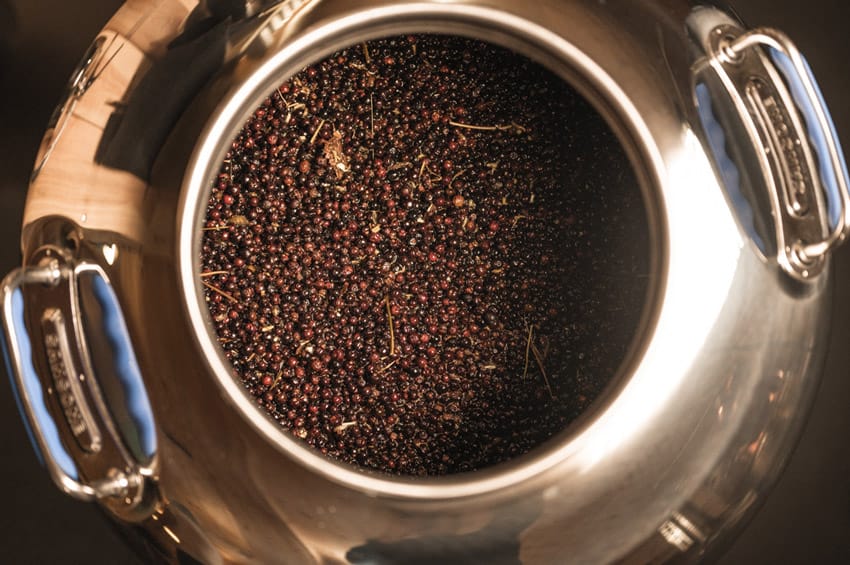
Discover botanicals yourself: Tips for gin lovers
A gin tasting offers you a fantastic opportunity to discover different botanicals and understand how they interact in gin. Imagine sitting at an elegant table, surrounded by a selection of gins and a variety of botanicals such as juniper, citrus fruits, herbs, and spices. An experienced gin expert will guide you through each tasting, explaining the characteristic aromas and flavor profiles of each botanical. You'll learn how to identify them and how they interact with other botanicals to give the gin its unique personality. This experience will expand your senses and offer you a deeper understanding of the diversity of botanicals.
Gin tasting at home can also be an entertaining and educational experience. In our guide “Expert tips for the perfect gin tasting at home” Find out how to organize your own gin tastings. You'll learn how to put together a selection of gins and botanicals to explore the variety of aromas and flavor profiles. You'll discover the unique characteristics of each ingredient and how they work together with others to give the gin its special personality.
In addition to tasting tips, we offer practical advice on how to make the most of your own gin tasting at home. From choosing glasses to organizing tasting notes, we give you all the information you need to make your gin tasting an unforgettable experience.
Conclusion: The Art of Botanicals in Gin
Botanicals are crucial to the uniqueness of each gin, giving it depth, complexity and identity. They are not just ingredients, but the essence of the gin, allowing each distillate to have its own personality. Experienced distillers use their deep understanding of these natural aromas to create spirits with harmonious and complex flavors. For connoisseurs, knowing the meaning and effect of botanicals offers a richer, more conscious drinking experience. Appreciating botanicals not only takes the enjoyment experience to a higher level, but also promotes the appreciation of authenticity and craftsmanship in the world of gin.
-

DRY GIN in gift box 500ml
72,00 €14,40 € / 100 ml
incl. 20% VAT
plus shipping costs
Product contains: 500 ml
Add to cart -

THORALM DRY GIN 500ml
Original price was: 59,90 €.45,00 €Current price is: 45,00 €.11,98 €9,00 € / 100 mlincl. 20% VAT
plus shipping costs
Product contains: 500 ml
Add to cart -

THORALM DRY GIN 6 x 500ml
339,40 €11,31 € / 100 ml
incl. 20% VAT
plus shipping costs
Product contains: 3000 ml
Add to cart
